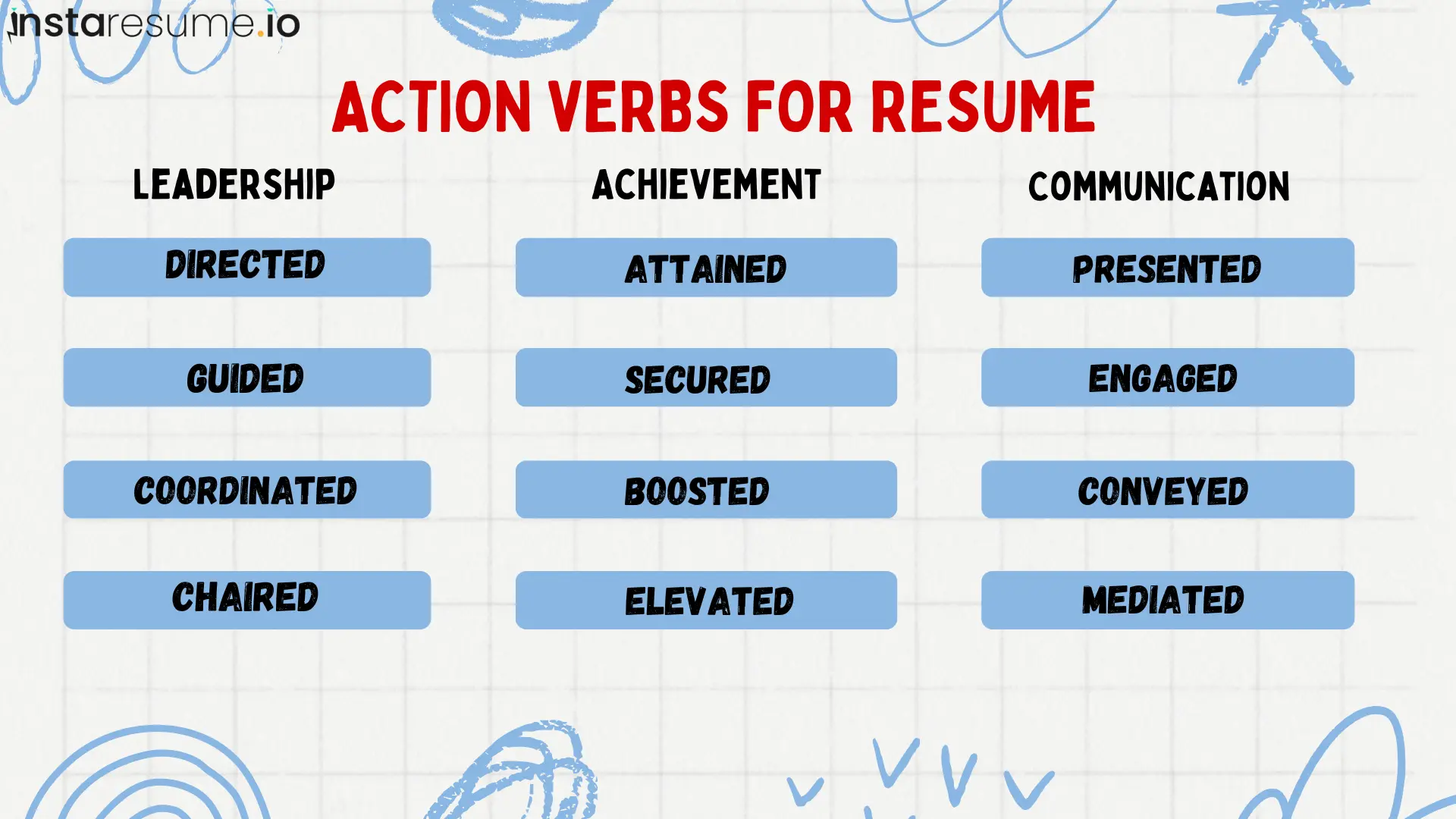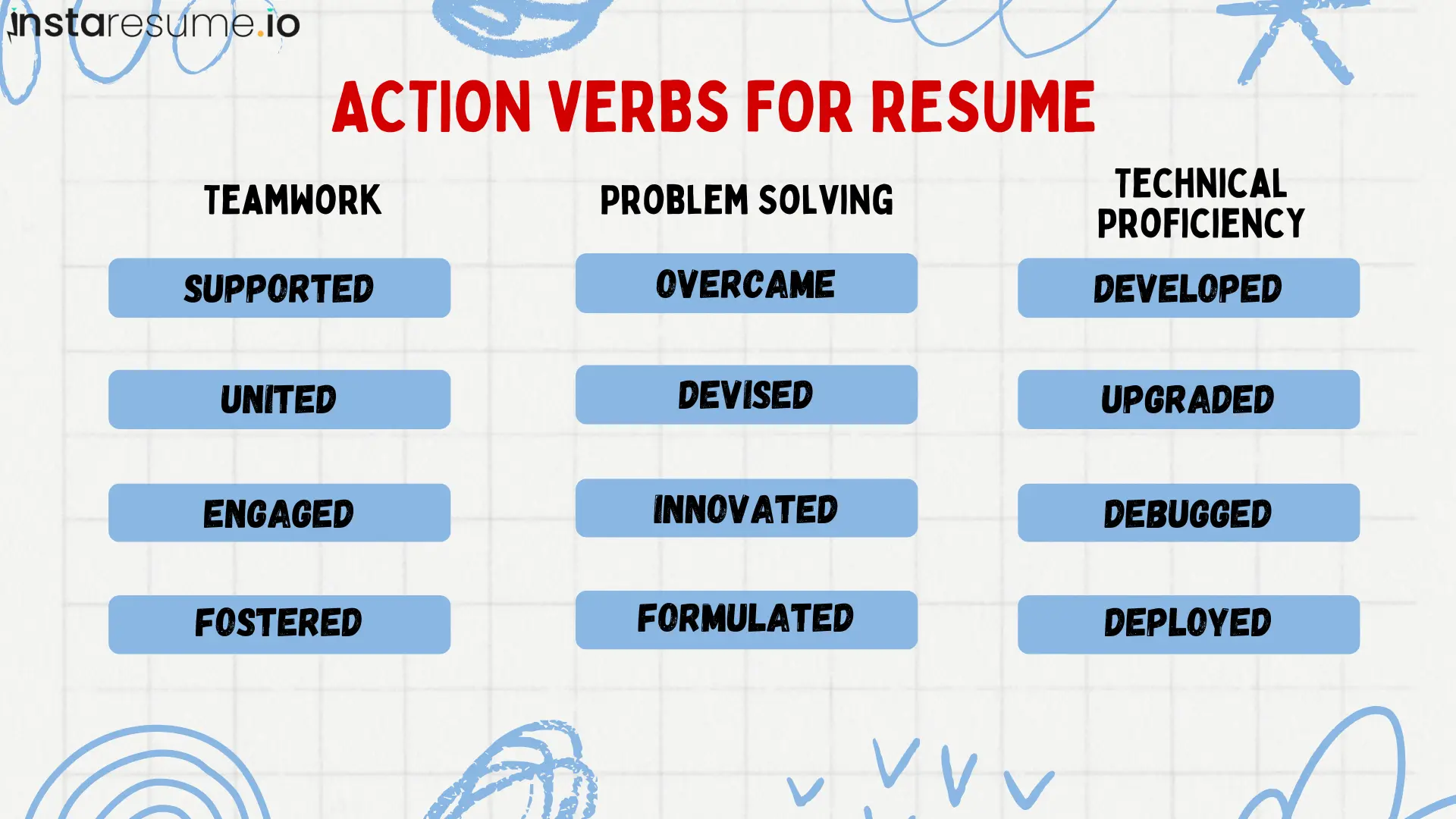Action Verbs for Resume: Guidance for an ATS-friendly CV
Introduction

Photo by Chase Clark on Unsplash
In the job market, your resume is more than a document; it's your key to new opportunities. Crafting a strong resume is essential — it's your chance to make a lasting impression on potential employers by showcasing your achievements and skills effectively. Action verbs are crucial for grabbing attention and distinguishing yourself from other candidates.
Action verbs transform your resume, turning it from a dull list of tasks into a lively story of your career. They inject energy and clarity into your achievements and responsibilities, making your resume more compelling. When wielded adeptly, these verbs vividly illustrate your capabilities and successes, helping hiring managers envision your potential contributions to their organization.
This blog aims to equip you with a handpicked selection of action verbs to elevate your resume's appeal. By incorporating these words, you'll enhance ATS compatibility and resonate with hiring managers, boosting your interview prospects. Let's embark on this journey to craft a compelling resume narrative that captivates and convinces.
Table of Contents
- What does the Action Verb Mean
- Benefits of Using Action Verbs in Your Resume
- How to Select the Right Action Verbs
- Categories of Action Verbs for Resume for Leadership and management
- Categories of action verbs for Achievement and Success
- Categories of action verbs for Communication and Collaboration
- Categories of action verbs for Team oriented Positions
- Categories of action verbs for Creativity and problem-solving
- Categories of action verbs for Technical Proficiency
- Mistakes to avoid
- Conclusion
What does the Action Verb Mean:
Action verbs are dynamic words that express actions, achievements, or capabilities within a sentence. Unlike passive language, which lacks directness and clarity, action verbs convey a sense of activity and accomplishment. They transform mundane job descriptions into vivid accounts of accomplishments and responsibilities, highlighting the candidate's impact and contributions compellingly.
In resume writing, action verbs play a crucial role in capturing the attention of hiring managers and portraying candidates as proactive and capable individuals. By employing action verbs such as “mentored,” “developed,” or “implemented,” applicants convey a sense of initiative and drive, effectively showcasing their skills and suitability for the position.
Ultimately, action verbs serve as powerful tools in crafting resumes that leave a lasting impression and increase the likelihood of securing job interviews. They enable candidates to stand out in a competitive job market by presenting their experiences and achievements dynamically and engagingly.
Benefits of Using Action Verbs in Your Resume
Using action verbs in your resume enhances its impact by showcasing your accomplishments rather than simply listing duties. These verbs inject dynamism, conveying your proactive contributions and results, which recruiters find compelling. By emphasizing achievements, you distinguish yourself as a candidate who can deliver tangible results, increasing your chances of securing interviews and job offers.
Utilizing action verbs in your resume creates a strong first impression by instantly conveying your proactive approach and achievements. These verbs grab the attention of recruiters, showcasing your capability to drive results and making you stand out among other applicants.
Incorporating action verbs in your resume effectively demonstrates specific skills and capabilities, providing concrete examples of your achievements and contributions. This approach showcases your expertise and suitability for the role, making it easier for recruiters to assess your qualifications and match them to the job requirements.
Utilizing action verbs in your resume enhances readability and engagement by injecting energy and clarity into your accomplishments. These verbs make your achievements more compelling and easier to understand, capturing the attention of recruiters and keeping them engaged throughout your resume.
Here you can further explore :
How to Use Action Verbs for an ATS-Friendly Resume
How to Select the Right Action Verbs
Selecting the right action verbs for your resume can significantly enhance its impact and help you stand out to potential employers. Here's how to choose the most effective ones:
Match the Job Description:
Review the job posting carefully and note the verbs used, especially in the responsibilities and qualifications sections. Use similar verbs in your resume to align with what the employer is looking for.
Industry-Specific Verbs:
Different industries favor certain verbs that resonate more strongly within their field. Research common verbs used in your industry or look at profiles of professionals in similar roles for inspiration.
Use Strong, Vivid Verbs:
Opt for verbs that convey action and results. Words like “achieved,” “developed,” “transformed,” and “initiated” showcase your contributions effectively.
Vary Your Verbs:
Avoid repeating the same verbs. Using a variety of action words will keep your resume engaging and highlight the breadth of your experience.
Prioritize Accomplishments:
When describing your experiences, start bullet points with verbs that emphasize your accomplishments and impacts.
Consider the Tense:
Use past tense for previous roles and present tense for your current position to keep your resume consistent and easy to follow.
Quantify Results:
Whenever possible, pair your action verbs with quantifiable results to provide context and scale to your achievements. For example, “Increased sales by 20% through strategic marketing initiatives.”
Avoid Overused Verbs:
While some verbs are popular because they're effective, try to avoid overused words like “managed” or “responsible for.” Instead, look for more specific verbs that accurately describe what you did.
Get Feedback:
Once you've drafted your resume, ask mentors, colleagues, or a career coach to review it. They can offer suggestions for stronger verbs or improvements based on their experience.
By carefully selecting the right action verbs, you can create a compelling resume that showcases your achievements and makes a strong impression on employers.

Leadership skills , achievements and communication skills action verbs
Categories of Action Verbs for Resume Leadership and Management
A commonly used leadership and management action verb in resumes is “Managed.”
Here are some powerful replacements that are appropriate to use.
Directed: Indicates a high level of responsibility and the ability to guide large projects or teams.
Led: Suggests a front-line role in steering initiatives or groups toward their goals.
Supervised: Implies overseeing the work of others to ensure quality and efficiency.
Coordinated: Highlights the ability to organize activities and people to work efficiently together.
Administered: Involves managing operations or systems, often with a focus on adherence to standards.
Oversaw: Indicates a supervisory role with a broad view of operations or project management.
Chaired: Suggests leading meetings or committees, highlighting a role in decision-making processes.
Orchestrated: Conveys the idea of arranging and directing complex operations to achieve a harmonious outcome.
Spearheaded: Shows initiative in leading projects or innovations from the front.
Pioneered: Indicates leading through uncharted territory or initiating new projects.
Delegated: Highlights the ability to assign tasks effectively, ensuring the right people handle specific duties.
Commanded: Suggests a strong leadership role, typically in situations demanding decisive action.
Mobilized: Implies the ability to get resources (human, financial, material) moving to achieve objectives.
Cultivated: Focuses on the development aspect of leadership, such as nurturing teams or fostering growth.
Guided: Indicates a mentorship approach to leadership, steering teams or individuals toward success.
Here's a resourceful guide for applicants across various fields to enhance their resumes.
Achievement and Success
For showcasing achievement and success in your resume, a commonly used leadership word is “Achieved.”
Here are some powerful replacements that are appropriate to use.
Accomplished: Demonstrates the successful completion of tasks or objectives.
Exceeded: Shows that you went beyond the expectations or targets.
Surpassed: Similar to exceeded, indicates outperforming set standards or benchmarks.
Realized: Conveys bringing plans, goals, or visions to fruition.
Attained: Highlights reaching a level of achievement, often through effort or skill.
Secured: Suggests achieving something through dedication or effort, such as securing funding or a significant deal.
Delivered: Emphasizes the successful delivery of results or projects.
Outperformed: Shows performing better than competitors or standards.
Generated: Indicates the creation or production of results, such as revenue or leads.
Boosted: Suggests an increase or improvement in performance or metrics.
Maximized: Demonstrates fully utilizing resources or opportunities to achieve the best possible outcomes.
Optimized: Highlights improving efficiency or effectiveness through strategic changes.
Elevated: Conveys taking something to a higher level or standard.
Transformed: Indicates making significant, positive changes to processes, products, or organizations.
Revolutionized: Suggests a dramatic, transformative impact on a field or operation.
Here's also a list for further exploration Resume action verbs
Communication and Collaboration
For highlighting communication and collaboration skills on your resume, a commonly used word is “Communicated.”
Here are some powerful replacements that are appropriate to use.
Articulated: Shows the ability to express ideas clearly and effectively.
Conveyed: Indicates the successful transfer of information or ideas to others.
Facilitated: Highlights the role of enabling or easing communication between groups.
Mediated: Suggests intervening in disputes or discussions to help reach an agreement.
Negotiated: Demonstrates the ability to reach mutually beneficial agreements.
Presented: Indicates giving information or ideas formally to an audience.
Collaborated: Shows working jointly with others towards a common goal.
Coordinated: Highlights organizing activities and people to operate efficiently together.
Harmonized: Suggests bringing different elements together into a coherent whole.
Engaged: Demonstrates actively involving or capturing the attention of others.
Liaised: Indicates acting as a link to assist communication between groups or individuals.
Networked: Shows the ability to connect and interact with others professionally.
Persuaded: Demonstrates the ability to convince others to understand a viewpoint or take action.
Synchronized: Highlights the coordination of actions, processes, or people to operate in unison.
Unified: Indicates the ability to bring people or groups together towards a common purpose.

Teamwork , problem solving and technical proficiency action verbs
Teamwork-oriented positions
For teamwork-oriented positions, a commonly used leadership word on resumes is “Led.”
Here are some powerful replacements that are appropriate to use.
Collaborated: Emphasizes working jointly with others to achieve a common goal.
Coordinated: Highlights organizing and aligning team efforts for efficiency.
Participated: Shows active involvement in team activities and projects.
Supported: Indicates providing assistance and backing to team members.
Facilitated: Suggests guiding and easing the process to help the team achieve its goals.
Harmonized: Conveys bringing together diverse elements of the team to work cohesively.
Mobilized: Demonstrates rallying the team or resources towards a common objective.
United: Showcases the ability to bring individuals together to form a strong team.
Engaged: Highlights actively involving team members and encouraging participation.
Fostered: Indicates nurturing a positive and productive team environment.
Empowered: Shows giving team members the authority and confidence to make decisions.
Integrated: Suggests successfully blending new members or ideas into the team.
Mediated: Demonstrates resolving conflicts within the team to maintain harmony.
Synergized: Conveys creating a greater effect by working together than individually.
Orchestrated: Highlights carefully arranging team roles and tasks to achieve the best performance.
Creativity and Problem Solving
For roles emphasizing creativity and problem-solving, a commonly used leadership word on resumes is “Solved.”
Here are some powerful replacements that are appropriate to use.
Devised: Indicates developing a unique or inventive solution to a problem.
Innovated: Shows the ability to introduce new ideas or methods.
Engineered: Suggests designing or building solutions, often with technical or detailed planning.
Formulated: Highlights creating or developing complex strategies or plans.
Conceptualized: Demonstrates the ability to envision and plan something innovative.
Transformed: Indicates making significant, positive changes to improve something.
Overcame: Shows successfully dealing with obstacles or challenges.
Pioneered: Suggests being the first to develop or use a new method or technology.
Revolutionized: Demonstrates dramatically changing the conventional approach to a problem.
Optimized: Highlights improving efficiency or performance through strategic changes.
Streamlined: Indicates simplifying a process to make it more efficient and effective.
Customized: Shows tailoring solutions to meet specific needs or requirements.
Refined: Suggests improving something by making small changes.
Reimagined: Demonstrates thinking about something in an entirely new or different way.
Troubleshoot: Indicates identifying and resolving complex problems, typically in technical contexts.
Read more : about approaches to solve a problem and how can one improve there problem solving skills
Technical Proficiency
For roles emphasizing technical proficiency, a commonly used leadership word on resumes is “Implemented.”
Here are some powerful replacements that are appropriate to use.
Developed: Indicates the creation or advancement of technology or software.
Engineered: Suggests designing or constructing solutions with technical expertise.
Architected: Shows the ability to design complex systems or structures.
Programmed: Highlights writing computer code for applications or systems.
Configured: Indicates setting up hardware or software to operate as needed.
Automated: Demonstrates the use of technology to make processes run without manual intervention.
Optimized: Suggests improving efficiency or performance through technical adjustments.
Integrated: Shows combining multiple systems or technologies to work together.
Upgraded: Indicates enhancing or improving existing technology or systems.
Debugged: Demonstrates identifying and fixing errors in code or systems.
Deployed: Highlights launching or rolling out new software or hardware.
Customized: Shows tailoring technology or systems to meet specific needs.
Revolutionized: Suggests dramatically changing a process, system, or industry through technology.
Streamlined: Indicates simplifying or making a process more efficient through technological means.
Secured: Demonstrates protecting information or systems from cyber threats.
Read more : About all the high income skills you need to learn in 2024.
Mistakes to Avoid
Including action verbs in your resume is a powerful way to showcase your skills and accomplishments. However, there are several common mistakes you should avoid to make sure your resume stands out for the right reasons. Here are some key points to keep in mind:
Overusing the Same Verbs: Repeating the same action verbs can make your resume seem monotonous. Aim for various verbs that accurately describe your different responsibilities and achievements.
Using Passive Language: Avoid passive constructions. Action verbs should be used to assert your direct role in accomplishments. For example, instead of saying “Was responsible for leading a team,” use “Led a team.”
Choosing Vague Verbs: Some verbs are too generic and don't convey much information (e.g., “Did,” “Made,” “Got”). Choose verbs that precisely reflect what you accomplished.
Neglecting to Match the Job Description: Tailor your resume's action verbs to match the skills and experiences the job listing emphasizes. This increases your chances of getting past automated resume screenings.
Forgetting to Quantify Results: Whenever possible, pair your action verbs with quantifiable results to provide context and demonstrate the impact of your actions. For example, “Increased sales by 20% through strategic marketing campaigns.”
Ignoring Industry-Specific Verbs: Use verbs that are relevant to your industry. This not only shows your expertise but also helps your resume resonate more with hiring managers in your field.
Failing to Use Present Tense for Current Roles: When describing your current job, use the present tense. Use past tense for previous roles. This helps differentiate your ongoing duties from past accomplishments.
Overcomplicating Your Language: While it's important to use dynamic verbs, avoid overly complex words that might confuse readers or come off as pretentious. Keep it clear and impactful.
Not Aligning with Your LinkedIn Profile: Ensure the action verbs and accomplishments on your resume match those on your LinkedIn profile for consistency. Discrepancies might raise questions for potential employers.
Skipping the Proofreading Process: Typos or grammatical errors can undermine the professionalism of your resume. Always proofread your resume, or even better, have someone else review it to catch mistakes you might have missed.
By avoiding these common pitfalls, you can effectively incorporate action verbs into your resume, making it more engaging and reflective of your professional achievements.
Conclusion
- In summarizing the vital role of action verbs in resumes, it's clear that these dynamic words are more than mere embellishments. They serve as powerful tools that breathe life into your professional experiences, making your accomplishments stand out vividly to hiring managers and Applicant Tracking Systems (ATS) alike.
- With this newfound understanding, I encourage you to revisit your current resume with a fresh set of eyes. See it as an opportunity to refine and energize your professional narrative, transforming it into a document that truly reflects your capabilities and achievements.
As a practical step forward, why not take on the challenge of replacing at least five passive phrases with impactful action verbs? Let this be your first step towards capturing the attention of your dream employer.Crafting an effective resume is essential for showcasing your skills, experience, and achievements to prospective employers. To optimize this task and make your resume stand out, consider leveraging the features offered by Instaresume.io.

